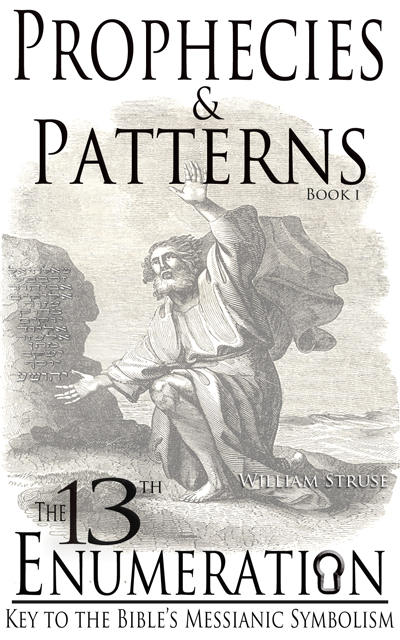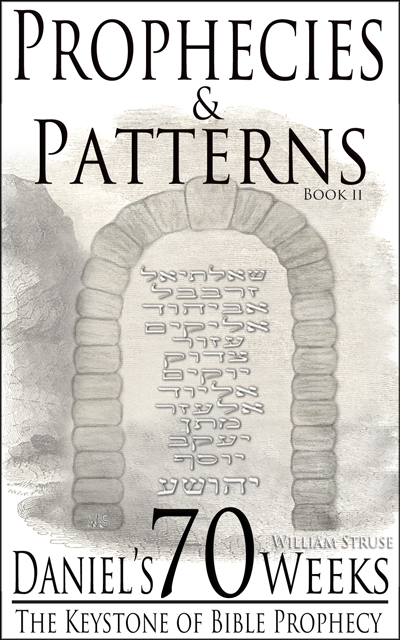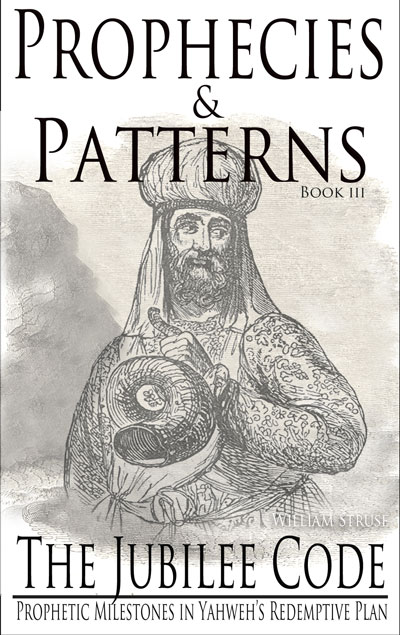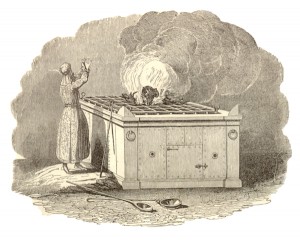 “Behold the Lamb of God, which taketh away the sin of the world.”
“Behold the Lamb of God, which taketh away the sin of the world.”
What powerful compelling words, which now nearly 2000 years later still reach across the ages, providing us with a vivid redemptive picture of the Son of God. Did you know these words were not spoken by a polished religious leader of Yeshua’s day, but rather a simple man who wore camel’s hair and ate locusts?
What’s even more fascinating about the these famous words is that John the Baptist spoke these words over two years before the death and resurrection of Yeshua. Do you get that? To you and me in retrospect, Yeshua as the symbolic “Lamb of God” makes perfect sense. After all, we have the gospel accounts which tell of His death and resurrection during the feast of Passover in the spring of 30 AD. But here John is proclaiming Yeshua as the promised Messiah, the Son of God, the “lamb of God which taketh away the sins of the world” nearly two years before it happened.
It is fascinating to me that in essence John the Baptist, by these famous words, was predicting the sacrificial redemptive death of the Yeshua years before even Yeshua’s own disciples understood the purpose of His first coming. Keep in mind that John, by proclaiming Yeshua the lamb of God, made it clear that there was a redemptive purpose to Yeshua’s ministry, a purpose that could only be understood within the sacrificial rites of the Torah.
So how did John know that Yeshua was the “lamb of God”? It’s clear from John 1 that John’s knowledge that Yeshua was the “Son of God” was a divine revelation, but that does not necessarily explain why John understood Yeshua as the “lamb of God”. To be sure there could have been further divine revelation and John may have also understood the redemptive nature of the coming Messiah from the many prophetic passages which speak of Him as such. But there is another reason which must have had some influence on his view of Yeshua as the lamb of God.
Remember Yeshua’s and John’s nativity stories are connected. In the sixth month of Elisabeth’s pregnancy, Mary conceived Yeshua by the Holy Spirit. Shortly thereafter Mary went to visit her cousin Elisabeth and was greeted by this salutation:
“And Mary arose in those days, and went into the hill country with haste, into a city of Juda; And entered into the house of Zacharias, and saluted Elisabeth. And it came to pass, that, when Elisabeth heard the salutation of Mary, the babe leaped in her womb; and Elisabeth was filled with the Holy Ghost:
And she spake out with a loud voice, and said, Blessed art thou among women, and blessed is the fruit of thy womb. And whence is this to me, that the mother of my Lord should come to me? For, lo, as soon as the voice of thy salutation sounded in mine ears, the babe leaped in my womb for joy.” (Luke 1:39-44 39)
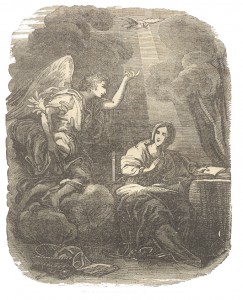 Based upon the above passage, John the Baptist had a special understanding of Yeshua from the very first few months of his life. This special knowledge was likely reinforced by John’s parents during the formative years of this life. You see, not only did Elisabeth understand that Mary was the mother of the promised Messiah but John’s father also had a prophetic revelation about the promised Messiah as well.
Based upon the above passage, John the Baptist had a special understanding of Yeshua from the very first few months of his life. This special knowledge was likely reinforced by John’s parents during the formative years of this life. You see, not only did Elisabeth understand that Mary was the mother of the promised Messiah but John’s father also had a prophetic revelation about the promised Messiah as well.
And his father Zacharias was filled with the Holy Ghost, and prophesied, saying,Blessed be the Lord God of Israel; for he hath visited and redeemed his people, And hath raised up an horn of salvation [yesha] for us in the house of his servant David; As he spake by the mouth of his holy prophets, which have been since the world began:
That we should be saved from our enemies, and from the hand of all that hate us; To perform the mercy promised to our fathers, and to remember his holy covenant; The oath which he sware to our father Abraham, That he would grant unto us, that we being delivered out of the hand of our enemies might serve him without fear, In holiness and righteousness before him, all the days of our life.
And thou, child [John], shalt be called the prophet of the Highest: for thou shalt go before the face of the Lord to prepare his ways; To give knowledge of salvation unto his people by the remission of their sins, Through the tender mercy of our God; whereby the dayspring from on high hath visited us, To give light to them that sit in darkness and in the shadow of death, to guide our feet into the way of peace. And the child [John] grew, and waxed strong in spirit, and was in the deserts till the day of his shewing unto Israel. (Luke 1:67-80 67)
It’s always thrilling to me to see the congruency of the Bible’s Messianic message. Here is Zacharias prophesying that his son John would prepare the way for the coming Messiah. Notice in verse 68 Zacharias tells those present that YHWH had visited His people. Remember it was Zacharias’ wife Elisabeth upon meeting Mary had the divine revelation that her cousin Mary was the one through whom YHWH sent the promised redeemer to visit His people.
But Zacharias doesn’t stop there. He connects this visitation, this redemptive promise of the coming redeemer with prophetic revelations given to two of the Old Testament’s most influential people. To get a sense of just how significant Zacharias’ words are let’s take a moment to revisit those words in the stories of king David and Abraham.
First the prophecy of David which tells of the “horn of Salvation” mentioned by Zacharias:
“…..And he said,> I will love thee, O YHWH, my strength. YHWH is my rock, and my fortress, and my deliverer; my God, my strength, in whom I will trust; my buckler, and the horn of my salvation, and my high tower. I will call upon YHWH, who is worthy to be praised: so shall I be saved from mine enemies.” (Psalm 18:1-3)
What’s fascinating about this passage is the underlying context as it relates to YHWH’s promised salvation, His “horn of Salvation”. (Keep in mind that Mary was told to name her child Yeshua, which means ‘YHWH’s Salvation’.)
In the Old Testament the word “horn” comes from the Hebrew qeren which means horn (fig. a horn of strength), of horn like projections on an altar, a hill, or rays of light.
Did you know that the first time qeren is used in the Bible, is as reference to the sacrificial substitution YHWH made on behalf of Isaac?
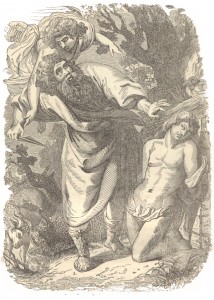 Most of you remember the story – Abraham was told to take his young son up to the mountain and offer him as a sacrifice. On the way Isaac innocently asks his father how they are going to sacrifice to YHWH without a lamb. Abraham responds to his son with those amazing words of faith:
Most of you remember the story – Abraham was told to take his young son up to the mountain and offer him as a sacrifice. On the way Isaac innocently asks his father how they are going to sacrifice to YHWH without a lamb. Abraham responds to his son with those amazing words of faith:
And Abraham said, My son, God will provide himself a lamb for a burnt offering: (Genesis 22:8)
Indeed YHWH provided a sacrifice in place of Isaac. That sacrifice was a ram caught by its horns (qeren) in a thicket.
“And Abraham lifted up his eyes, and looked, and behold behind him a ram caught in a thicket by his horns [qeren]: and Abraham went and took the ram, and offered him up for a burnt offering in the stead of his son. And Abraham called the name of that place Jehovahjireh: as it is said to this day, In the mount of YHWH it shall be seen.” (Genesis 22:13-14)
YHWH’s sacrificial substitution there on the mountain became the symbolic standard for His redemptive plan. For those willing to see, He was telling mankind that He would provide Himself as a sacrifice for our sins. As the new testament records, YHWH became flesh through a Hebrew maiden named Mary. Nearly 2000 years later, on that very same mountain where Abraham bound Isaac and placed him on the altar, Yeshua (YHWH”s Salvation) offered Himself for the sins of mankind. He became that sacrifice foreshadowed in Genesis 22, that “horn of salvation”, as well as sacrificial atonement to which the entire sacrificial system of the Torah pointed.
And he [Yeshua] said unto them, These are the words which I spake unto you, while I was yet with you, that all things must be fulfilled, which were written in the law of Moses, and in the prophets, and in the psalms, concerning me.
“Then opened he their understanding, that they might understand the scriptures, And said unto them, Thus it is written, and thus it behoved Christ to suffer, and to rise from the dead the third day: And that repentance and remission of sins should be preached in his name among all nations, beginning at Jerusalem. And ye are witnesses of these things.” (Luke 24:44-48)
But there is more to Zacharias wonderful prophecy concerning the coming Messiah that many miss when looking at Luke 2 and it is also related to Genesis 22. What I’m talking about is the “mercy” and the “covenant” which Zacharias describes as an “oath” which YHWH swore with Abraham. You see after Abraham demonstrated his faith there on the mountain, YHWH swore with Abraham the first covenant made with any man in the Bible. Here is that famous covenant:
“And the angel of YHWH called unto Abraham out of heaven the second time, And said, By myself have I sworn, saith YHWH, for because thou hast done this thing, and hast not withheld thy son, thine only son:
That in blessing I will bless thee, and in multiplying I will multiply thy seed as the stars of the heaven, and as the sand which is upon the sea shore; and thy seed shall possess the gate of his enemies; And in thy seed shall all the nations of the earth be blessed; because thou hast obeyed my voice.” (Genesis 22:15-18)
As the New Testament writers explain this promised “seed”, through whom all the nations of the earth would be blessed, was none other than Yeshua.
“Ye are the children of the prophets, and of the covenant which God made with our fathers, saying unto Abraham, And in thy seed shall all the kindreds of the earth be blessed. Unto you first God, having raised up his Son Jesus, sent him to bless you, in turning away every one of you from his iniquities.” (Acts 3:25-26)
“That the blessing of Abraham might come on the Gentiles through Jesus Christ; that we might receive the promise of the Spirit through faith. Brethren, I speak after the manner of men; Though it be but a man’s covenant, yet if it be confirmed, no man disannulleth, or addeth thereto. Now to Abraham and his seed were the promises made. He saith not, And to seeds, as of many; but as of one, And to thy seed, which is Christ.” (Galatians 3:14-16)
I would be remiss here if I did not mention two other great Old Testament prophets who also talked about this “covenant and mercy” swore with Abraham.
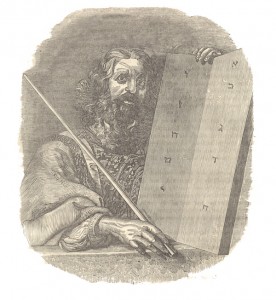 Nearly 300 years after Abraham, Moses, just before he passes leadership to Joshua (Yeshua) reminds Israel of the oath YHWH swore with Abraham, that oath which speaks of the coming Messiah.
Nearly 300 years after Abraham, Moses, just before he passes leadership to Joshua (Yeshua) reminds Israel of the oath YHWH swore with Abraham, that oath which speaks of the coming Messiah.
“For thou art an holy people unto YHWH thy God: YHWH thy God hath chosen thee to be a special people unto himself, above all people that are upon the face of the earth. YHWH did not set his love upon you, nor choose you, because ye were more in number than any people; for ye were the fewest of all people:
But because YHWH loved you, and because he would keep the oath which he had sworn unto your fathers, hath YHWH brought you out with a mighty hand, and redeemed you out of the house of bondmen, from the hand of Pharaoh king of Egypt. Know therefore that YHWH thy God, he is God, the faithful God, which keepeth covenant and mercy with them that love him and keep his commandments to a thousand generations;” (Deuteronomy 7:6-9)
“Not for thy righteousness, or for the uprightness of thine heart, dost thou go to possess their land: but for the wickedness of these nations YHWH thy God doth drive them out from before thee, and that he may perform the word which YHWH sware unto thy fathers, Abraham, Isaac, and Jacob.” (Deuteronomy 9:5)
After Moses, another 1000 years pass and a Hebrew captive to the king of Babylon gives one of the most impassioned prayers found in the Old Testament. This captive named Daniel prays to YHWH that Israel’s sins would be forgiven and that his people might return to service YHWH in Jerusalem. In the 9th chapter of the book that bears his name, Daniel opens his plea to YHWH with a call to remember the “covenant and mercy” promised to the fathers.
“And I set my face unto the Lord God, to seek by prayer and supplications, with fasting, and sackcloth, and ashes: And I prayed unto YHWH my God, and made my confession, and said, O Lord, the great and dreadful God, keeping the covenant and mercy to them that love him, and to them that keep his commandments;” (Daniel 9:3-4)
In answer to Daniel’s prayer, YHWH reveals to Daniel what is arguably the most important messianic prophecy in the Bible, a prophecy which reveals to mankind the precise time when that famous messianic promise would be fulfilled. You and I know that prophecy as the 70 Weeks of Daniel 9. This prophecy has the distinction of being the only prophecy in the Bible which gives a specific datable timeline for the coming of the promised redeemer.
And this brings us full circle to Zacharias’ prophecy of the coming redeemer which was given 8 days after the birth of John the Baptist. At this time Mary was 3 months pregnant with Yeshua (YHWH’s Salvation). Thus Zacharias’ words came the very year in which the prophecy of 70 “weeks” predicted the fulfillment of the “covenant and mercy” of the promised messianic “seed”.
So next time you hear the words “behold the lamb of God which taketh away the sins of the world” I hope you’ll also remember the story of Zacharias, Elisabeth, and John. Three faithful people used by YHWH to prepare the way for the coming of the promised Redeemer, a redeemer who was prophesied of “in the law of Moses, the prophets, and the Psalms.”
“And his disciples asked him, saying, Why then say the scribes that Elias must first come? And Jesus answered and said unto them, Elias truly shall first come, and restore all things. But I say unto you, That Elias is come already, and they knew him not, but have done unto him whatsoever they listed. Likewise shall also the Son of man suffer of them. Then the disciples understood that he spake unto them of John the Baptist.” (Mathew 17:10-13)
“Now when Jesus had heard that John was cast into prison, he departed into Galilee; And leaving Nazareth, he came and dwelt in Capernaum, which is upon the sea coast, in the borders of Zabulon and Nephthalim: That it might be fulfilled which was spoken by Esaias the prophet, saying, The land of Zabulon, and the land of Nephthalim, by the way of the sea, beyond Jordan, Galilee of the Gentiles; The people which sat in darkness saw great light; and to them which sat in the region and shadow of death light is sprung up. From that time Jesus began to preach, and to say, Repent: for the kingdom of heaven is at hand.” (Matthew 4:12-17)
“The people that walked in darkness have seen a great light: they that dwell in the land of the shadow of death, upon them hath the light shined….
For unto us a child is born, unto us a son is given: and the government shall be upon his shoulder: and his name shall be called Wonderful, Counsellor, The mighty God, The everlasting Father, The Prince of Peace. Of the increase of his government and peace there shall be no end, upon the throne of David, and upon his kingdom, to order it, and to establish it with judgment and with justice from henceforth even for ever. The zeal of YHWH of hosts will perform this.” (Isaiah 9:2, 6-7)
* * *

